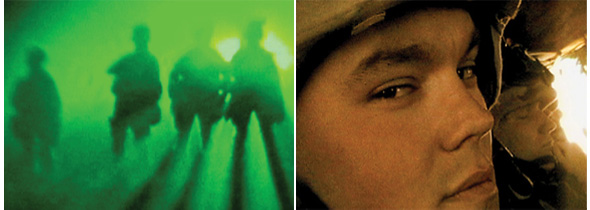documentary
Diary of a Soldier
A Marine documents the real life of those serving in Iraq
by Kevin Fallon / CAS ’09
“Here’s the truth about being a Marine that you won’t find on the local news,” says First Lieutenant Michael Scotti (STERN ’07) in the recent documentary film Severe Clear. “We’re loud, we drink too much, fight too much, swear too much, and truth be told, our rifle is the only thing we think about more than sex.” Scotti, as both narrator and cinematographer, offers an unusual firsthand portal into the lives of Marines fighting in Operation Iraqi Freedom. Shot using his handheld mini-DV cam, the film follows Scotti and his comrades from the barracks, where they binge drink and bond frat-boy style, to the streets of Iraq, where, in one scene, they’re caught reeling at the sight of a young girl whose brain has come out of her skull after being shot in the head.
The title Severe Clear comes from a term pilots use to describe a post-storm sky so pristine that visibility seems infinite—conditions famously present in New York City on the morning of September 11, 2001. However, these same conditions can also create the illusion of no horizon, dangerously blurring the sky and ocean, and the film shows how the “clarity” Scotti and his comrades project on the way to war gives way to confusion and unpredictability in the heat of battle. The Hollywood Reporter called the film a “visceral true-life portrait of the brutality and chaos of war,” and it has earned acclaim from The New York Times and Variety, among others. It was an official selection at this year’s Salem Film Festival, where it took the Jury Prize, and the International Rome Film Festival, where it won Special Mention for Cinematic Excellence.
The documentary’s power lies in its unique vantage—the soldier’s eye view. As a forward observer responsible for calling in the coordinates of enemy artillery, Scotti was able to film action scenes without neglecting his duties. Initially, he’d intended to use the footage as a video diary for a memoir, finding it easier to record a quick 40 seconds here and there than scribble a few sentences. When he returned to New York in 2003, fresh off tours in both Afghanistan and Iraq, he went to the Tisch School of the Arts in search of an editor to make sense of the nearly 22 hours of video. He was referred to Kristian Fraga (TSOA ’97) of Sirk Productions who, upon viewing it, changed everything. “He told me to screw the book,” Scotti recalls. “This is a movie.”
Over the next few years, Scotti balanced the creation of the film with MBA classes at the Leonard N. Stern School of Business. He also founded the NYU Stern Military Veterans Club, which recruits veterans, helps with their transition into business school, and raises money for military families. After graduation, Scotti managed debt for distressed companies, but as Severe Clear gained traction—Grammy nominee Cliff Martinez (Traffic) agreed to compose a score and the film was set to debut at SXSW Film Festival in 2009—promoting the film became a full-time job. Since then it has enjoyed a limited release in the United States and been featured on CNN, NPR, and FoxNews.
Unlike most war flicks, where Hollywood actors play the soldiers, these characters are just boys—real boys. One scene in which a group of soldiers play football could be mistaken for a group of sophomores on the commons of some university—were it not for the battleship that served as the playing field. In another moment, the viewer is with them when one hears “Incoming!”—before the screen goes black to the sounds of gunshots and screaming. But stolen conversations, where soldiers candidly resent their status as the “shitheads defending your freedom” or gossip about Jennifer Lopez, deliver perhaps more “reality” than any war story to date. “The poster-boy image of the Marine Corps is true—we have honor, we love our country, we’d die for anybody,” Scotti says. “But then you take the Marine off the poster, and this movie—that’s what happens.”
The Severe Clear DVD can be ordered at severeclear.wordpress.com.
Unlike most war flicks, the characters in this film are just boys—real boys.







